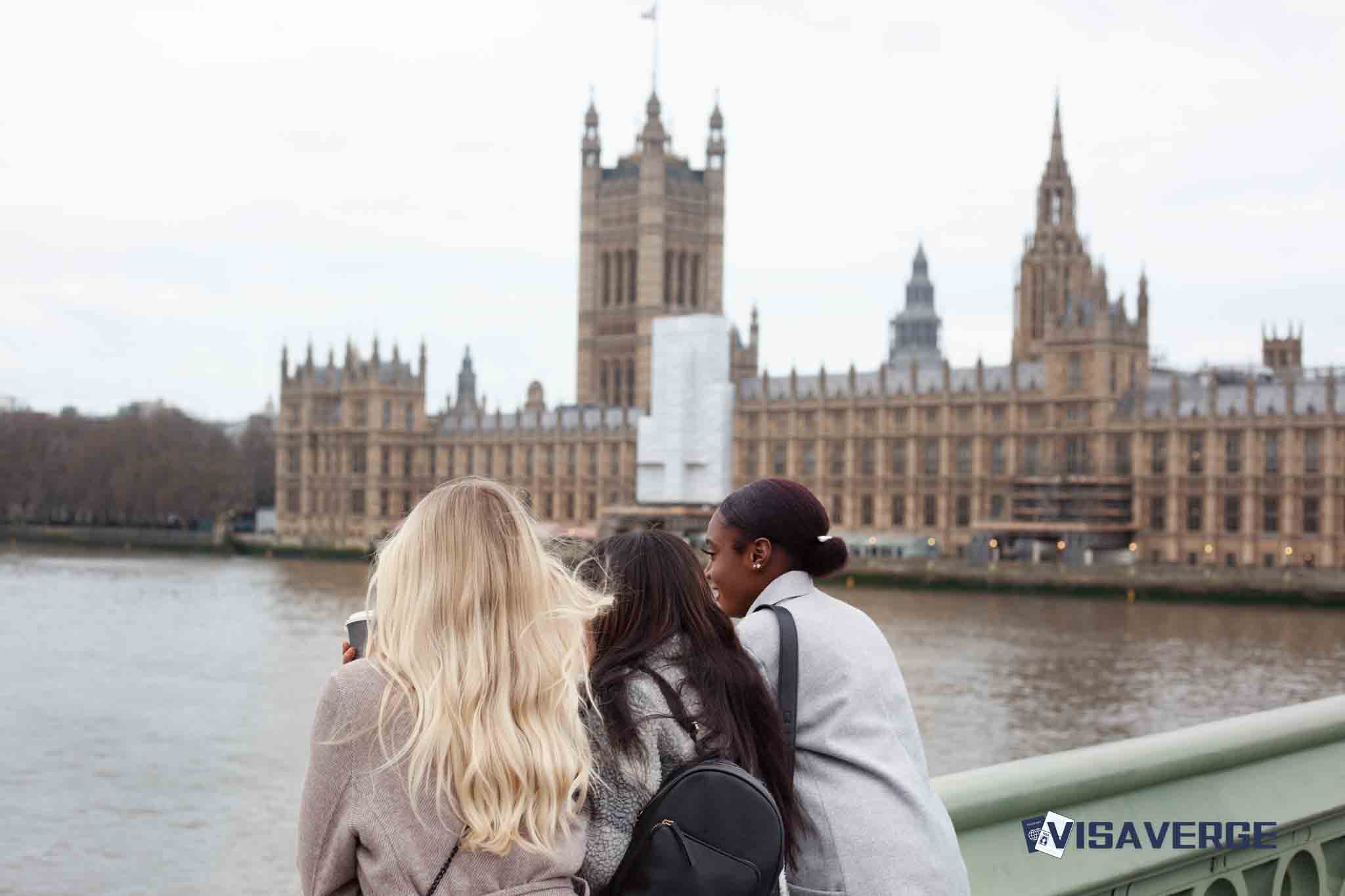(UNITED KINGDOM) International students in the UK will be able to move straight from study to starting a business under a major immigration change taking effect on 25 November 2025, when those holding a valid Student visa will be allowed to switch directly into the Innovator Founder visa without leaving the country. The Home Office reform, which applies across the UK, removes the long‑standing rule that forced would‑be entrepreneurs to depart and apply from overseas before returning to build their companies.
Ministers say the measure is designed to keep promising founders in the country at the moment they are most likely to launch high‑growth start‑ups, instead of breaking their plans with costly and uncertain trips abroad. For thousands of graduates who already have business ideas in advanced stages, the date marks a clear turning point — creating a new bridge from classroom to company formation and placing the UK in sharper competition with other study‑abroad destinations that court entrepreneurial talent.

What changed and why it matters
Until now, international graduates who wanted to use the Innovator Founder visa had to interrupt their lives in Britain, leave at the end of their Student visa, file a fresh application from abroad, and then wait for a new decision before being able to return and launch their venture. That break often meant giving up lab space, losing access to university support, and pausing relationships with early customers and investors.
For start‑ups at a delicate stage, even a few months away from the UK market could be the difference between success and failure. The new rule keeps that momentum onshore by allowing eligible students to submit their Innovator Founder application from inside the country as soon as they have completed their course, or, in the case of doctoral candidates, after they have been studying full time for at least twenty‑four months.
According to analysis by VisaVerge.com, this aligns immigration rules more closely with the way modern start‑ups actually grow, because many founders test and refine their ideas while they are still on campus and need a clear, predictable way to stay once their Student visa runs out.
Eligibility and endorsement requirements
Students planning to switch directly into the Innovator Founder visa still have to pass strict checks on the strength of their business idea and their personal circumstances. Officials stress that the reform is not an open door but a change in where the application can be made.
Key eligibility points:
– Must have completed the course for which they were sponsored, or — for PhD students — have studied full time for at least two years.
– Must obtain an endorsement from one of the government‑approved endorsing bodies.
Endorsing bodies assess proposals for:
– Originality — the idea must be new rather than a copy of an existing trading business.
– Innovation — it should be innovative in its market.
– Viability — evidence it can be a long‑term source of income.
– Scalability — potential to create jobs and expand nationally or internationally.
Points system — what applicants must score
The core points grid governing Innovator Founder remains unchanged by the new in‑country switching right. Applicants must reach 70 points in total.
Points breakdown:
– Up to 50 points for the business itself:
– New founders: 30 points for a robust plan + 20 points for proving the venture is innovative, viable and scalable.
– Founders continuing an existing endorsed business: points awarded for proving the business is genuinely trading, showing progress, and demonstrating ongoing involvement in day‑to‑day management.
– 20 points for mandatory personal requirements:
– 10 points for English language at level B2 (a standard many degree‑level students already meet).
– 10 points for financial maintenance — holding at least £1,270 in personal savings to show ability to support themselves while building the business.
Notable contrast: the financial threshold is far lower than earlier entrepreneur categories that required proof of £50,000 in funding. This lower barrier aims to attract founders with strong ideas but more modest personal funds.
Length of stay, extension and settlement
Successful applicants switching from a Student visa will initially get permission to stay in the UK for three years. They can:
– Extend for another three years, or
– Apply for permanent settlement once they meet residence rules.
Time spent on this route counts towards the five‑year residence period required for indefinite leave to remain, making the route a viable long‑term option for entrepreneurs.
Employment and monitoring:
– Founders are expected to focus on the endorsed business but may do secondary skilled employment if it does not distract from the venture and complies with visa conditions.
– The number of mandatory formal check‑ins between founders and endorsing bodies has been reduced from three to two, decreasing administrative burden on start‑ups.
Local and sector impacts
For universities and local economies that invest in attracting international students, the ability to switch directly into a business route without leaving the UK is expected to have wide effects:
– Graduates who might previously have returned home now have a clearer reason to stay and build companies in British cities.
– This can increase local hiring, office rentals, and the strength of regional start‑up ecosystems.
– Accelerator programmes, seed investors and university incubators can better align support with immigration timetables.
Sector focus:
– Master’s and PhD students in technology, life sciences, and creative industries are expected to show strong interest, since university research often underpins commercial start‑ups.
For many students, the reform turns what used to be an abrupt immigration cliff edge at graduation into a potential launch pad — especially for those not choosing the Graduate route but wanting to run a high‑growth enterprise.
Remaining hurdles and practical constraints
The reform does not remove all barriers. Important points to note:
Endorsement remains demanding:
– Wanting to start a business is not enough.
– Endorsing bodies require detailed, credible plans backed by research, pilot testing, or early commercial traction.
– Applicants must explain how their product or service differs from existing offerings, the revenue model, and their growth plan.
– The business must be genuinely new — joining or taking over an existing trading company is generally not acceptable, which excludes many side jobs and family ventures.
Practical travel constraint:
– Once a Student submits an Innovator Founder application from within the UK, they are generally advised not to travel outside the UK, Ireland, the Channel Islands or the Isle of Man while the application is pending.
– Leaving the common travel area during this period can cause the application to be treated as withdrawn, risking loss of Student visa protection and the chance to switch in‑country.
This travel restriction will influence how final‑year students plan around the 25 November 2025 start date; many may delay trips home or fieldwork until a decision is received.
How to apply and where to get details
Official guidance, online forms, fees and supporting document lists are on the government’s Innovator Founder guidance page: https://www.gov.uk/innovator-founder-visa.
Application practicalities:
– Most applicants will apply digitally via their Home Office account.
– Biometric appointments or use of an identity verification app will be required where directed.
– Students who previously provided fingerprints and a photo for their Student visa will find aspects of the process familiar, but the outcome will have higher long‑term consequences.
Policy context and debate
Policymakers frame the decision as part of the UK’s effort to compete globally for entrepreneurial talent. Other study destinations already offer graduate pathways to build companies grown from research or side projects.
Supporters argue:
– Forcing talented people to leave and reapply sent a message of risk and uncertainty.
– Allowing direct switching keeps focus on whether the venture is new, innovative, viable and scalable — and whether it can add jobs and tax revenue in the UK.
Critics worry:
– Schemes for high‑skill migration might be abused or act as an easier path to long‑term residence.
Home Office response:
– The layered points system, endorsement requirement, and business monitoring are intended to keep the route focused on serious founders.
– Permission can be curtailed if a business stops trading or no longer meets the agreed plan.
– Settlement remains conditional on meeting strict residence and success measures.
What this means for students
Choices facing final‑year students:
– Some will opt for the relative security of the Graduate route or traditional skilled employment.
– Others may choose the risk and independence of becoming an Innovator Founder.
What the rule change does:
– Makes the Innovator Founder option realistic and legally secure without the disruption of leaving the country to apply.
– Changes the post‑degree narrative for many international students — transforming the end of a Student visa from a full stop into the opening chapter of an entrepreneurial life in the UK.
For the government, each successful founder also serves as a public example that study‑to‑start‑up pathways can work in practice for students and communities alike.
Frequently Asked Questions
This Article in a Nutshell
Effective 25 November 2025, international students with valid Student visas can switch in‑country to the Innovator Founder visa, avoiding previous overseas application requirements. Eligible applicants must have completed their sponsored course (PhD students need two years full‑time), secure endorsement from an approved body, and meet a 70‑point threshold including B2 English and £1,270 maintenance. Initial leave is three years, extendable for another three and counts toward five‑year settlement. Travel outside the common travel area while applications are pending is discouraged.













